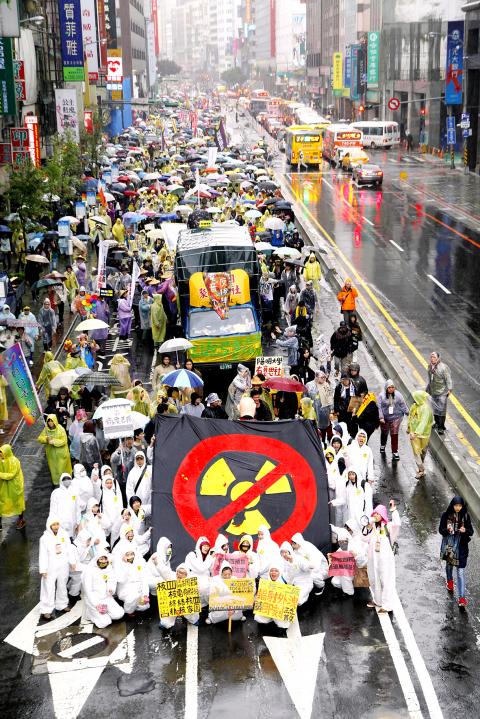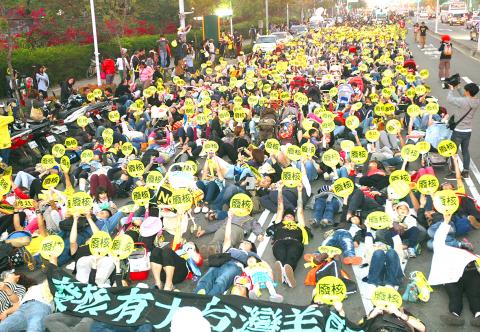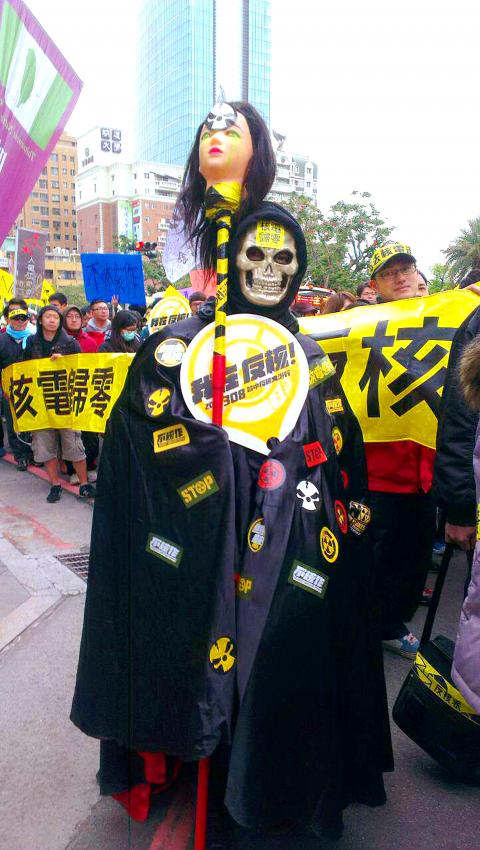Tens of thousands of people braved the rain yesterday afternoon to take part in nationwide demonstrations calling for an end to nuclear power plants in Taiwan.
The protests, staged three days ahead of the third anniversary of the Fukushima Dai-ichi nuclear disaster in Japan, took place simultaneously in Taipei, Greater Taichung, Greater Kaohsiung and Taitung.
The National Nuclear Abolition Action Platform — the event’s organizer, an alliance of more than 100 civic groups — demanded that the government immediately halt construction of the Fourth Nuclear Power Plant in New Taipei City’s Gongliao District (貢寮) and remove nuclear waste from Orchid Island (Lanyu, 蘭嶼).

Photo: EPA
The group asked lawmakers to cut the budget allocated for the new plant, pass a resolution calling for an end to nuclear power and amend the Referendum Act (公民投票法) to lower the referendum threshold.
In Taipei, a woman using a wheelchair held a handmade sign that read: “In a nuclear disaster, people in wheelchairs cannot escape,” while gender and gay rights advocacy groups held rainbow-colored signs that read: “We want orgasms, not nuclear waste” and “We may not have the same sexual preference, but we have the same anti-nuclear opinion.”
Dozens of young people danced to loud electronic dance music as they paraded while shouting: “My electro music does not want to use electricity generated by nuclear energy; my party does not fear oppressive authority.”

Photo: Huang Chih-yuan, Taipei Times
“How can I not stand up today,” said a 76-year-old fisherman surnamed Lu (盧) from New Taipei City’s Jinshan (金山), adding that he has lived in Jinshan all his life, with his home only about 5km from the plant, between two operating nuclear power plants.
“I didn’t know there were so many spent fuel rods in the plants until we had the chance to visit one of them, and I became worried, because the spent fuel pools are almost full. Will they take the fuel rods out of the water?” Lu said. “We have nowhere to run to if a disaster occurs and Taipei will be in danger.”
A highlight of the parade yesterday took place at the intersection of Zhongxiao W Road and Zhongshan S Road, where a group of residents living near nuclear facilities, young people, artists and civic groups stopped traffic by lying or sitting down on the road, as a fake nuclear accident siren sounded.

Photo: Hsu Kuo-chen, Taipei Times
The action prompted police intervention.
Green Citizens’ Action Alliance secretary-general Tsuei Su-hsin (崔愫欣) said that since the Fukushima Dai-ichi accident, annual anti-nuclear parades in Taiwan held in 2011, 2012 and last year all showed that most of the public are against nuclear power.
“The government is still stubbornly ignoring public opinion. When it wanted to push nuclear power, it said the policy was already decided and it was only acting according to the law, so people living near the facilities had no right to refuse. Now the government is using our tax money to threaten and lie to us, when it should communicate with the public and let us decide,” she said.
Tsuei said this year will be the beginning of a “citizens won’t cooperate” movement, which would make an oppressive government understand that “Taiwan doesn’t want nuclear power, the people can decide their own future.”
According to the event’s organizers, the Taipei protest drew more than 80,000 people, while other rallies held simultaneously across the country had a combined turnout of more than 50,000.
The nation has three active nuclear power plants that generate about 20 percent of its electricity.
The state-run Taiwan Power Co (Taipower, 台電) yesterday said that the Fourth Nuclear Power Plant will meet the highest safety standards before beginning operations.
Taipower vice president Chen Pu-tsan (陳布燦) said a safety review of the plant’s 126 systems is expected to be completed by the end of June, after which a report will be submitted to the Atomic Energy Council for review.
Chen stressed that passing safety inspections is just one of 75 requirements that the power plant needs to meet before fuel rods can be installed in its No. 1 reactor.
Additional reporting by AFP and CNA

TRAGEDY STRIKES TAIPEI: The suspect died after falling off a building after he threw smoke grenades into Taipei Main Station and went on a killing spree in Zhongshan A 27-year-old suspect allegedly threw smoke grenades in Taipei Main Station and then proceeded to Zhongshan MRT Station in a random killing spree that resulted in the death of the suspect and two other civilians, and seven injured, including one in critical condition, as of press time last night. The suspect, identified as a man surnamed Chang Wen (張文), allegedly began the attack at Taipei Main Station, the Taipei Fire Department said, adding that it received a report at 5:24pm that smoke grenades had been thrown in the station. One man in his 50s was rushed to hospital after a cardiac arrest

SAFETY FIRST: Double the number of police were deployed at the Taipei Marathon, while other cities released plans to bolster public event safety Authorities across Taiwan have stepped up security measures ahead of Christmas and New Year events, following a knife and smoke bomb attack in Taipei on Friday that left four people dead and 11 injured. In a bid to prevent potential copycat incidents, police deployments have been expanded for large gatherings, transport hubs, and other crowded public spaces, according to official statements from police and city authorities. Taipei Mayor Chiang Wan-an (蔣萬安) said the city has “comprehensively raised security readiness” in crowded areas, increased police deployments with armed officers, and intensified patrols during weekends and nighttime hours. For large-scale events, security checkpoints and explosives

A car bomb killed a senior Russian general in southern Moscow yesterday morning, the latest high-profile army figure to be blown up in a blast that came just hours after Russian and Ukrainian delegates held separate talks in Miami on a plan to end the war. Kyiv has not commented on the incident, but Russian investigators said they were probing whether the blast was “linked” to “Ukrainian special forces.” The attack was similar to other assassinations of generals and pro-war figures that have either been claimed, or are widely believed to have been orchestrated, by Ukraine. Russian Lieutenant General Fanil Sarvarov, 56, head

PUBLIC SAFETY: The premier said that security would be tightened in transport hubs, while President Lai commended the public for their bravery The government is to deploy more police, including rapid response units, in crowded public areas to ensure a swift response to any threats, President William Lai (賴清德) said yesterday after a knife attack killed three people and injured 11 in Taipei the previous day. Lai made the remarks following a briefing by the National Police Agency on the progress of the investigation, saying that the attack underscored the importance of cooperation in public security between the central and local governments. The attack unfolded in the early evening on Friday around Taipei Main Station’s M7 exit and later near the Taipei MRT’s Zhongshan